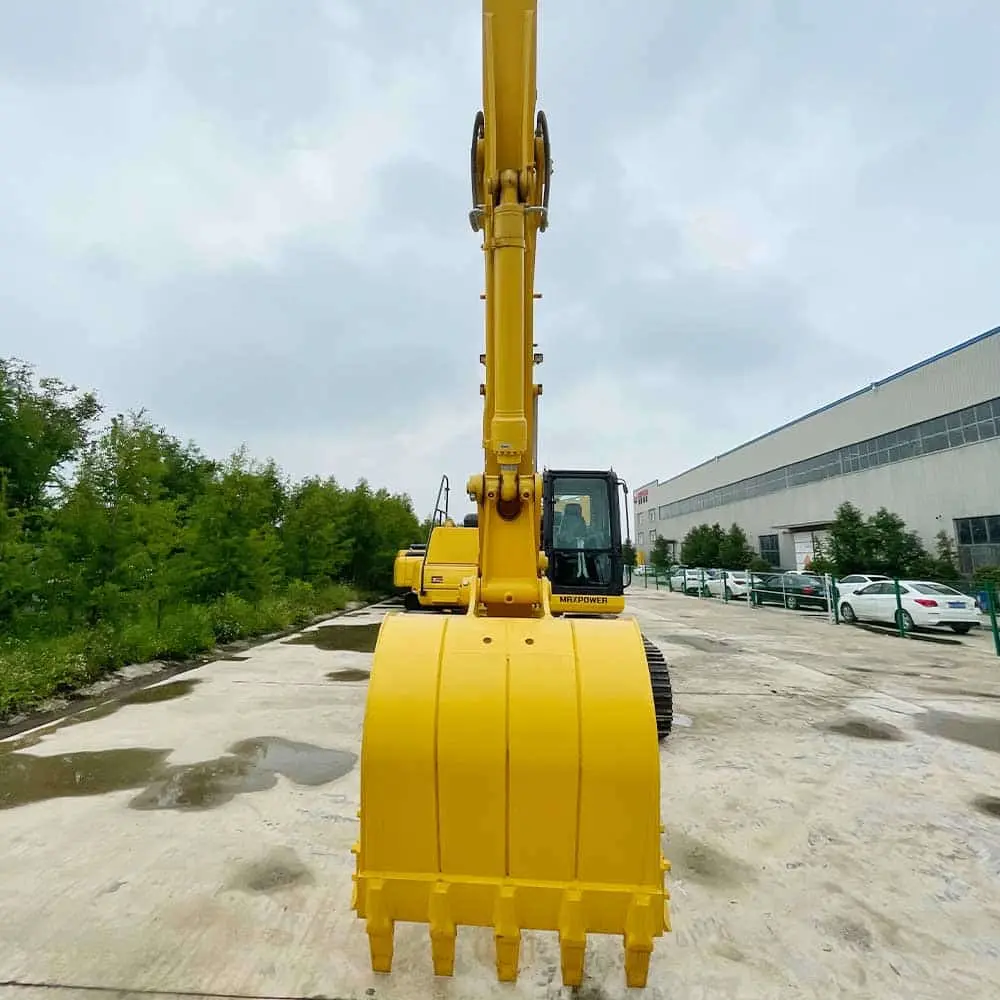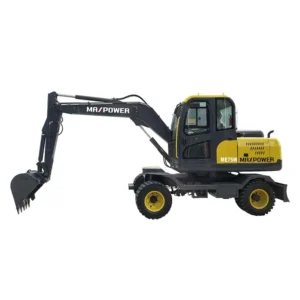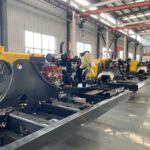Introdução

Excavator selection is crucial for optimizing productivity and efficiency on any construction or excavation project. Understanding the key distinctions between wheel excavators and crawler excavators empowers you to choose the machine that aligns with your specific requirements and terrain conditions.
Mobility and Speed
Wheel excavators, also known as mobile excavators, are renowned for their mobility and speed. Mounted on wheels, they can travel quickly between job sites, reducing downtime and increasing overall efficiency. Their maneuverability makes them well-suited for tasks in confined spaces or projects that require frequent relocations.They are often utilized in urban construction projects, where space is limited and quick movement between locations is essential. The versatility of wheel excavators makes them a valuable asset in various industries, from road construction to utility work. Their ability to navigate tight spaces with ease and speed up the workflow sets them apart as a reliable choice for contractors looking to optimize their operations.
Key Advantages of Wheel Excavators
- Superior Mobility: Wheel excavators can travel at speeds of up to 25 miles per hour, significantly faster than crawler excavators. This mobility allows them to move between job sites efficiently and reduce downtime.
- Maneuverability in Tight Spaces: Their compact size and ability to turn sharply make wheel excavators ideal for operating in confined spaces or congested work areas.
- Reduced Transportation Costs: Wheel excavators can often be transported without the need for specialized trailers or permits, saving on transportation expenses.
Common Applications
- Urban Construction: Their mobility and maneuverability make them well-suited for construction projects in urban areas with narrow streets and limited workspaces.
- Road and Highway Construction: Wheel excavators excel in road and highway construction tasks, such as trenching, loading, and backfilling.
- Utility Excavations: Their maneuverability makes them suitable for utility excavations, such as digging trenches for pipes and cables.
- Landscaping Projects: Wheel excavators are commonly used in landscaping projects for tasks like tree removal, grading, and material handling.
Crawler Excavators: Stability and Power
Crawler excavators, also known as track excavators, are distinguished by their superior stability and powerful digging capabilities. Their tracked design provides exceptional traction and stability on uneven, loose, or slippery surfaces, making them ideal for challenging terrains.
Key Advantages of Crawler Excavators
- Enhanced Stability: The wide tracks of crawler excavators distribute weight evenly, providing exceptional stability on uneven, loose, or slippery ground. This stability allows them to operate safely and efficiently in challenging conditions.
- Superior Digging Force: Crawler excavators typically generate greater digging force than wheel excavators, enabling them to tackle tougher digging jobs and handle heavier materials.
- Versatility in Applications: Their stability and power make crawler excavators suitable for a wide range of applications, including mining, quarrying, and heavy-duty construction.
Common Applications for Crawler Excavators

- Mining and Quarrying: Their power and stability make crawler excavators ideal for mining and quarrying operations, where they handle tough materials and challenging terrains.
- Heavy-Duty Construction: Crawler excavators are often used in heavy-duty construction projects, such as excavating foundations, trenching for pipelines, and lifting heavy machinery.
- Land Clearing and Site Preparation: Their ability to handle difficult terrains makes crawler excavators suitable for land clearing and site preparation tasks.
- Demolition and Salvage: Crawler excavators are frequently employed in demolition and salvage operations due to their power and stability.
Wheel Excavator vs. Crawler Escavadora
| Recurso | Wheel Excavator | Crawler Excavator |
|---|---|---|
| Mobility | High | Low |
| Manobrabilidade | Excelente | Bom |
| Stability | Fair | Excelente |
| Digging Force | Moderate | High |
| Terrain Suitability | Firm, Level Ground | Uneven, Loose, or Slippery Ground |
| Transportation Costs | Lower | Higher |
| Common Applications | Urban Construction, Road and Highway Construction, Utility Excavations, Landscaping Projects | Mining and Quarrying, Heavy-Duty Construction, Land Clearing and Site Preparation, Demolition and Salvage |
Conclusão
The choice between a wheel excavator and a crawler excavator ultimately depends on the specific needs and terrain conditions of your project. If mobility and maneuverability are crucial, a wheel excavator is the ideal choice. However, if stability, power, and the ability to handle challenging terrains are paramount, a crawler excavator is the better option. By carefully considering these factors, you can make an informed decision that optimizes productivity, efficiency, and safety on your construction or excavation project.
Perguntas frequentes
What is the primary difference between a wheel excavator and a crawler excavator?
The primary difference lies in their mobility and terrain adaptability. Wheel excavators have rubber tires and are suited for smooth, paved surfaces, offering high mobility. Crawler excavators have tracks, providing better stability and traction on rough terrains.
Which type of excavator is more cost-effective?
Wheel excavators generally have lower operating costs due to reduced maintenance and better fuel efficiency. However, the choice depends on the project requirements and terrain.
Can a wheel excavator be used for heavy-duty tasks?
While wheel excavators are versatile, they are typically less powerful than crawler excavators and may not be suitable for extremely heavy-duty tasks on rough terrains.
Are crawler excavators suitable for urban projects?
Crawler excavators can be used in urban projects, but their tracks can damage paved surfaces, and their lower mobility can be a drawback compared to wheel excavators.
What are the maintenance requirements for both types of excavators?
Wheel excavators generally have lower maintenance needs, focusing on tire upkeep. Crawler excavators require more frequent maintenance of their tracks and undercarriage components.








-150x150.webp)
